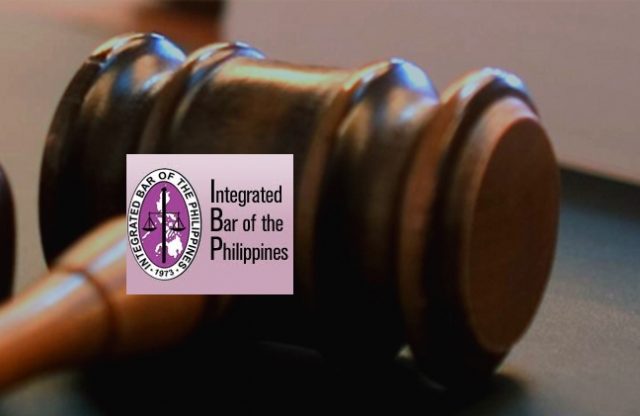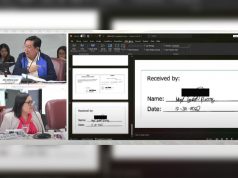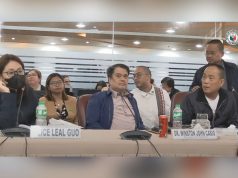The Integrated Bar of the Philippines (IBP), the official organization of all Philippine lawyers whose names appear in the Roll of Attorneys of the Supreme Court, issued a statement Saturday on the looming controversy between the Court of Appeals and the House of Representatives on the detention of the so-called “Ilocos 6”.
The Ilocos six were members of the staff of the Office of the Governor of Ilocos Norte Province, who were cited in contempt by the House of Representatives during the course of a legislative inquiry into a questioned financial transaction there.
IBP called for “a calm appreciation of the issues and the application of the pertinent laws and rules upon the matter.”
“It is the considered position of the Board of Governors of the Integrated Bar of the Philippines that … there are a number of matters that should be clarified so that the true issues can be tackled with proper discernment and to avoid further dissention and discord between these two co-equal branches of government.
“It is well-settled that the House of Representatives has the power and authority to hold persons in contempt and to order the detention of such persons. This is true whether the House is acting as a whole or through any of its committees.
“It is equally well-settled that the Court of Appeals has jurisdiction over petitions for habeas corpus, a power and authority that it shares with the Regional Trial Courts and, of course, the Supreme Court.
“The Ilocos 6 were ordered to be arrested and detained because the Committee on Good Government and Accountability of the House of Representatives held them in contempt for refusing to answer questions or being unduly evasive in answering questions during a legislative inquiry. Again, this is well within the power and authority of Congress and is not, therefore, a justiciable issue.
“A petition for habeas corpus was filed with the Court of Appeals questioning the propriety of their detention on the basis of the assertion that in refusing to answer questions of the committee, they invoked their constitutional right against self-incrimination. The petition was acted upon by the Court of Appeals. Again, such a petition is clearly within the jurisdiction of the Court of Appeals.
“While the authority of the House of Representatives to hold persons in contempt and order their detention is beyond question, the determination of whether or not the right of the Ilocos 6 against self-incrimination was properly invoked is, however, a justiciable issue that is well within the authority of the judiciary to determine.
Precisely, IBP pointed out, “the remedy available to any person who would like to question the propriety of his detention, by any instrumentality or institution of the State, on the ground of the violation of his constitutional rights is to file a petition for habeas corpus.
“As of yet, there has apparently been NO DETERMINATION, on the part of the Court of Appeals, on the issue of the propriety of the application of the right against self-incrimination in the proceedings before it. Simply put, the Court of Appeals has not ruled to say that the House Committee on Good Government and Accountability acted in excess of its power and authority.
“The order of release was premised upon the fact that the Ilocos 6 applied for, and were granted, BAIL for their PROVISIONAL liberty. The right to bail is another constitutional right that the Court of Appeals has the authority to grant in habeas corpus proceedings unless the detained person is under a charge for an offense punishable by death …
“Under the circumstances, despite the public perception, it does not appear that the Court of Appeals has infringed upon, interfered with or denied, the power or authority of the House of Representatives.
“If the House of Representatives is of the position that the grant of bail by the Court of Appeals was done in grave abuse of discretion, the remedy to question the order in a petition for certiorari under Rule 65 that may be filed with the Supreme Court.
“If, in the future, the Court of Appeals should find that there was a violation of the constitutional right of the Ilocos 6 against self-incrimination, the remedy is to appeal such a judgment to the Supreme Court.
“There is no need at all to foment dissention and discord between the judiciary and Congress.
The three (3) branches of government, the Executive, the Legislative and the Judiciary are co-equal precisely for the purpose of checks and balances. This is so to prevent any of these branches from overreaching its authority to the prejudice of our people.
“It is on this note that the Board of Governors of the Integrated Bar of the Philippines calls upon the members of the bar in Congress to act as light bringers and advocates of sobriety to bring about an end to this looming controversy. Let the Rule of Law prevail through the exercise and application of the remedies provided under the law and the Rules of Court.
“On its part, the Board of Governors strongly urges the House of Representatives to reconsider its position by recalling the show cause order issued against the justices of the Court of Appeals.
“Our country is presently embroiled in the fight against terrorism which has prompted the President to declare martial law in Mindanao. We certainly do not need to compound our problems with a constitutional crisis between the two other branches of government.
“Particularly under the present situation, it behooves us all, as Filipinos, to foster unity and solidarity rather than foment discord for the greater good of our people.”










